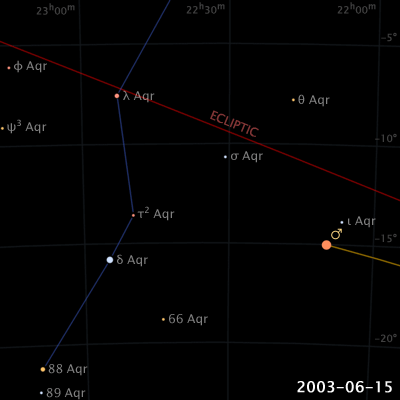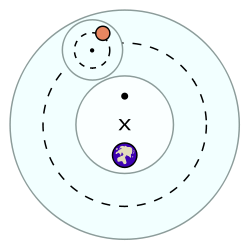When you go outside at night, on a clear night away from all lights, you see the sky the same way the ancients did: full of stars.

Now, if you looked up periodically, you would find that the sky appears to rotate! Some constellations rise while others set, and one point -- either due north or due south depending on your hemisphere -- appears to not move at all. With the advent of time-lapse photography (and go here for a fantastic video), we can see that the sky does something like this:

So there's some pretty good evidence, right away, that either the Earth is rotating or the entire sky is rotating. But there are a few bright objects in the sky that don't make this same motion every night. A few of them move to a different point in the sky each night. The Ancient Greeks called them planetas, or wanderers.
If you look at a planet, like Mars, relative to the other stars, it appears to zip through the sky in one predominant direction. But every once in a while, it does something bizarre. It stops, goes backwards, stops again, and then resumes its original direction. This -- today -- is wikipedia's featured picture of the day:

So, how do you explain that one, folks? Well, Ptolemy came up with a simple, elegant, and completely wrong explanation. He said that instead of Mars moving in a circle around Earth, it moved on a "circle within a circle", allowing it to sometimes go backwards:

It wasn't until nearly 1500 years later, when Copernicus realized that if an inner planet moved faster than an outer planet, it would appear that Mars moved backwards from the point of view of Earth.

So that's the cause of the apparent "retrograde motion" of Mars. What the history books don't tell you? By time Copernicus came along, Mars' orbit had been so carefully studied that geocentric modelers of the Solar System had placed seventy-eight epicycles on Mars' orbit!
And, much like you, I wonder what blind alley we're inadvertently treading down, adding epicycles to, all because we don't have the proper perspective? (My guess is dark energy, but who knows?)

Good article. One point -- did Copernicus actually reject epicycles? While he made many big strides, including his explanation of apparent retrograde motion, I think his system still employed epicycles and epicyclets on the assumption of a circle-based system. Doesn't matter much in terms of modern science, just a point of curiosity.
Unless the observations indicating the acceleration of the expansion of the universe are wrong or have been misinterpreted. it would appear that there has to be some sort of repulsive force around. I think that dark energy should be considered a place holder at this point in time until more information becomes available.
I have to say that, when I was a graduate student, if someone had claimed that only 5% of the total matter in the universe was that which is conventionally observed, he/she would have been considered raving bonkers.
Retrograde motion of the planets featured on Wikipedia, Perseid meteor showers, and the Saturnian equinox (Okay, this one's the least impressive in that it's distinguished by what you don't see. But still ...) all in one night. Wow!
Ptolemaic astronomy is wrong in the same way that Newtonian physics is wrong. It is a scientific theory of remarkable and practical power whose slight mismatch to the data it predicts pointed the way to much better theories. We err when we slight it. It was one of the first accomplishments of science. The remarkable thing is that so little progress was made between Ptolemy and the renaissance.
Aristarchus developed a heliocentric theory, but that work doesn't survive. Aristarchus also, correctly, advocated that the stars had to be very distant, to account for their lack of (then measurable) parallax.
Reading my comment, someone might incorrectly think Aristarchus followed Ptolemy. In fact, he preceded Ptolemy by four centuries.
You have made an art of explaining difficult astronomical matters. Now I have a new weapon in my arsenal to explain to astrological fanatics why Mars or Mercury seem to have a retrograde motion. It is not easy to understand and many people are too lazy to make the effort.
Speaking of Dark Energy, something has to account for the acceleration of the universe. Now if one accepts that using Type 1a supernova as a measuring tool to determine distance is rather accurate, then one also cannot but further agree that compared to the distant universe, we are indeed accelerating in our expansion. Now, if dark energy doesn't account for this, I doubt any other forces do as well. We may be scratching at the wrong wall as far as the details of dark energy, but in all likelihood, there is substance to that theory. I'm not astrophysicist mind you, nor for that matter an economist, but if I had to gesture a guess at anything that may be turn out to be modern epicycles, it's probably economic theory.
Yes, very few books point out that the heliocentric planetary system proposed by Kepler, Newton, and others eventually won over the geocentric model because the calculations were so much simpler.
I'd say anything in Cosmology or sub-atomic particle physics is fair game for accruing epicycles. Even 60 years ago people like Feynman were complaining about people coming up with new ideas and new particles when measurements were rather scant. Even Murray Gell-Mann didn't always agree with Feynman - I wish I could find the "consult Feynman's entrails" quote. However, if there ever was a discipline whose sole purpose were to make things complicated, nothing compares to String Theory. No other theories in existence can make such a complex mess of calculations while not revealing anything new or making predictions not possible with simpler existing models.
Re dark energy and dark matter, and with the caveat that i am but a cell biologist and therefore out of my depth when it comes to astronomy: when we say "dark" energy and matter, we just mean "stuff we can't see because it's not shiny and/or exerting gravitational effects on shiny stuff we can see", right? not that there are strange and unfamiliar kinds of energy and matter that we haven't detected closer to home?
but if it does mean "stuff we can't see", why is its existence a surprise? why would we have thought that we could detect all that there is to detect out in space when we can't even see 10x-earth-sized planets around distant stars?
"dark energy" and "dark matter" sound very exotic and voodoo-like.
great post, though. i love the diagram movie.
Julia: With respect to "dark matter", that term simply means that we can't see it. We know it's there because we can measure the effects of its gravity (if it has mass, it has gravity) on luminous matter. For example, we can measure the rotational speed of galaxies as a function of distance from the center, and we find that the outer part of the rotating disc is moving faster than we would expect if most of the matter around the galaxy were the stuff we can see. Yes, some of it is in the form of non-luminous ordinary matter, but it turns out the majority of it (I don't have a handy reference for the exact proportions) is stuff other than protons and neutrons, and we don't know what that stuff is.
"Dark energy", by contrast, does not exert a gravitational force. It does exert a pressure, and it is that pressure which accounts for the accelerating expansion of the universe.
Though without a background in astrophysics and such, I always wondered if dark matter and dark energy are because of the assumptions that are not valid in these cases.
Eric, that's easily misleading; dark matter is definitely NOT just stuff we can't see, it's stuff that doesn't behave like any the stuff we DO see. Ethan's post one the galaxy collision showing dark matter and "regular stuff" separating clearly demonstrates it's not "galactic coal dust" but something "out of this world" in regards to its non-gravitational properties.
The strange thing for me, is that almost nobody in the Pre-Copernican times assumed that Mercury and Venus orbit really the Sun and not the Earth. Even, when they were completely aware of the fact that Mercury and Venus do not depart the Sun away more than a maximum elongation.
My guess for epicycles would be evolutionary psychology, and yes, economy if it sticks with coherently rational players. Definitely not dark energy, since it simplifies _a lot_ of physics (sundry cosmology observations, GR cc, theories with vacuum energy).
That is exactly why it's more likely to be correct than the other ideas. (I won't call them physics theories, as they can't predict dynamics.)
A simple theory describing complex phenomena will end up with a complex description, while a complex theory describing complex phenomena may have simpler descriptions.
Choosing between a parsimonious and so a priori likelier correct theory, and an unparsimonious theory, say quantum gravity which has to add in particles by hand, the choice is simple.
Um, the assumptions _are_ valid, or these theories wouldn't predict the observations. Falsified predictions, likely falsified set of assumptions. (Not necessarily though, the theory can also be inconsistent or something such.)
Maybe you mean that those aren't the only valid assumptions (and so theories) that can be made, but at least in the case of DM there are no such contenders any longer. (IIRC Ethan's (?) posts on SB.)
Hit it bro, I think you got it this time!
R
www.online-anonymity.net.tc
Concerning dark matter Ptolemysm, you may be interested about this
By time Copernicus came along, Mars' orbit had been so carefully studied that geocentric modelers of the Solar System had placed seventy-eight epicycles on Mars' orbit!
Sorry this statement is total crap! I have explained the actual historical facts here along with some answer to questions in the comments.
My family sits in our backyard most nights looking at constellations and planets in Monument, CO. I was wondering why the Big Dipper has been in the North Sky and same place every night for the past three months while many other constellations are moving. Now I know.